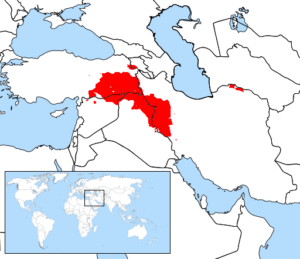Introduction
The Kurds are an ethnic group native to the region known as Kurdistan, which spans the geopolitical boundaries of four countries: Turkey, Syria, Iraq and Iran. Considered the largest ethnic group without a state
, the Kurds have for centuries faced harsh oppression from their imposed rulers, which has resulted in a brutal history of attempted genocide that continues to the present day.
Most Kurds speak the official languages of the nation states within which they live, especially as the Kurdish language has been banned for much of the past centuries in most of them. However, the Kurdish language is experiencing a resurgence in large part due to the work of the Kurdish Freedom Movement. Kurdish comes in many dialects, such as Sorani and Kurmanji, and different dialects use different scripts for writing.
Kurdistan

Kurdistan translates into “the land where Kurds live.” Whilst Kurdistan is not recognised as its own state, the Kurds consider it their homeland regardless of its official status. In Kurdish, the regions of Kurdistan are generally referred to as:
- Bakur (
North
, a.k.a. southeastern Turkey); - Rojhilat (
East
, a.k.a. western Iran); - Başûr (
South
, a.k.a. northern Iraq); and - Rojava (
West
, a.k.a. northern Syria).
Bakur
The modern Kurdistan Freedom Movement began in Bakur in the 1970s, with the foundation of the Kurdistan Worker’s Party (PKK). Under the Turkish state’s policy of Turkification, Kurds were denied the right to speak their own language, learn about their own history and were even referred to as Mountain Turks
in an attempt to erase Kurdish identity. Faced with extreme violence from the state, the PKK began a period of armed struggle against the Turkish state from the 1980s, with the goal of an independent socialist Kurdistan. Things have changed a lot since then, and you can find out more about the history of the Kurdistan Freedom Movement here.
Despite multiple attempts to arrange a ceasefire, the current Turkish government, led by the authoritarian Recep Tayyip Erdoğan, has renewed its push to suppress not only Kurdish autonomy in Turkey, but Kurdish language, identity and culture, and has even reached outside of its own borders in pursuit of its genocidal ambitions.
Rojhilat
Kurds in Rojhilat (also written Rojhelat) are, along with many other activists and minority groups in Iran, subject to intense persecution and violence. The Kurdistan Freedom Movement is organised in Rojhilat, but is underground due to oppression in the cities, as well as guerilla forces in the mountains. You can find a good source of information about struggles in Rojhilat here.
Başûr
Most of Başûr operates as a semi-autonomous region under the constistution of Iraq, under the control of the Kurdistan Region of Iraq (KRI). The KRI operates as a client state of the US and survives largely on petroleum exports, and is mainly controlled by the powerful and corrupt Barzani clan. The Barzani clan have a tactical alliance and trade agreements with Turkey, have a track record of cooperating with the Turkish state’s attacks on the Kurdistan Freedom Movement and tend to follow a capitalist and right-wing nationalist political line. However, the Kurdistan Freedom Movement does organise within Başûr and there have been many expressions of solidarity between the people of Başûr with the movement in Rojava.
Rojava
During the Syrian ‘Civil’ War, beginning with the city of Kobane, northern regions of Syria began declaring autonomy from the brutal Assad regime, and became the initial three self-governing cantons of Afrin, Kobane and Cizire (Jazira) from 2012. During the bloody years that followed, Kurdish-led forces and their allies successfully repulsed the ISIS insurgency, turning the tide of the war, and liberated large amounts of land and people, including coming to the defence of the Yezidis of Sinjar after a horrific massacre in 2014. While the original areas in which the Rojava Revolution took place were the Kurdish-majority regions of Syria, as territory was liberated from ISIS the Autonomous Administration of North and East Syria expanded to incorporate Arab-majority areas under a pluralistic, social justice-based form of stateless self-government.
Related Posts
- What’s Happening in Rojava? (17 Feb 2026)
- What’s Happening in Rojava? (w/c Feb 2)
- Calls to Action
- What’s Happening in Rojava? (w/c Jan 27)
- Demonstrations
- Solidarity Statements
- Media Coverage
- Political Correspondence
- [RECORDED] Online Info Call: Update from Rojava NE Syria and How to Help
- What’s Happening in Rojava